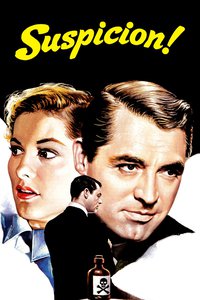Suspicion (1941)

Johnnie Haysgarth (Grant) is a playboy and a gambler who makes all the society pages. Lina McLaidlaw (Fontaine) is a General’s daughter. She’s as serious as Johnnie is frivolous. But, when they meet on a train, she is taken with his charm, even though she’s a little shocked that he’s travelling in first class with only a third class ticket.
So, Johnnie courts her, possibly because she’s so unattainable and he loves the challenge. Even though he lets her down on several occasions, she can’t stop herself from falling in love with him in that curious 1940s movie way. By this, I mean she resists and resists and then appears to give in for no apparent reason, other than the plot demands it.
Unfortunately, as soon as the honeymoon’s over, it’s really over. Despite all his promises, Johnnie can’t be responsible. He doesn’t want a job—he wants an unearned income. He’s as generous as the day is long when he’s had a win on the horses, but mostly he’s borrowing or stealing from friends and family. He has many get-rich-quick schemes which all seem to be based on his pal Beaky Thwaite (Bruce) putting up the cash while the profits are shared.
Worse still, he appears to have grown tired of Lina lecturing him. When Beaky goes missing and is presumed murdered, she begins to suspect that her handsome husband has been involved, especially since he keeps checking books on poisons out of the library...
It may come as a surprise to note that Cary Grant and Alfred Hitchcock made only four films together: Suspicion, Notorious, To Catch a Thief and North By Northwest). Although many people believe that Charade is a Hitchcock film, it’s actually directed by Stanley Donen of Singin’ in the Rain fame.
Nonetheless, when you think of Hitchcock’s leading men, you undoubtedly think of Cary Grant. Perhaps it’s because he lends himself so well to this sort of thriller. He’s so smooth that he seems good enough to eat, but he just might be too good to be true. It’s entirely for this duality that Hitchcock cast him. And it’s therefore a shame that the abrupt, forced ending does not pay off on this promise.
In her second role for Hitchcock, Fontaine starts off dowdy—a little too dowdy for Grant to be chasing her for anything other than her money, frankly—then blossoms as she opens herself up to her attractive new husband. Fontaine is one of those 1940s actresses that I usually don’t like—from the Celia Johnson school of icy reserve—but here she is convincing as the young wife unsure as to whether her husband really is evil or her own middle-class prejudices are clouding her opinion of him.
Nigel Bruce clearly sets the tone for his appearances as Dr John Watson against Basil Rathbone’s Sherlock Holmes. Beaky Thwaite is a bumbling but good-hearted fool and Bruce goes a good way toward enlivening the somewhat flat mid-section.
Everybody rightly highlights the famous scene where Grant takes a glass of milk up to his wife. Hitchcock backlit the glass so that it had an eerie glow on camera and you can understand why Fontaine thinks it’s poisoned. But you need to wait a good long while before this scene occurs and the tension really hits fever pitch. There’s too much time wasted at the beginning showing that Johnnie is a gambler and a cheat, especially since this is all but established in the first reel with the train tickets.
Although not one of Hitchcock’s best, it’s an above average thriller, but does feel as if it could have been a much better film if the director had been allowed to keep his original ending.